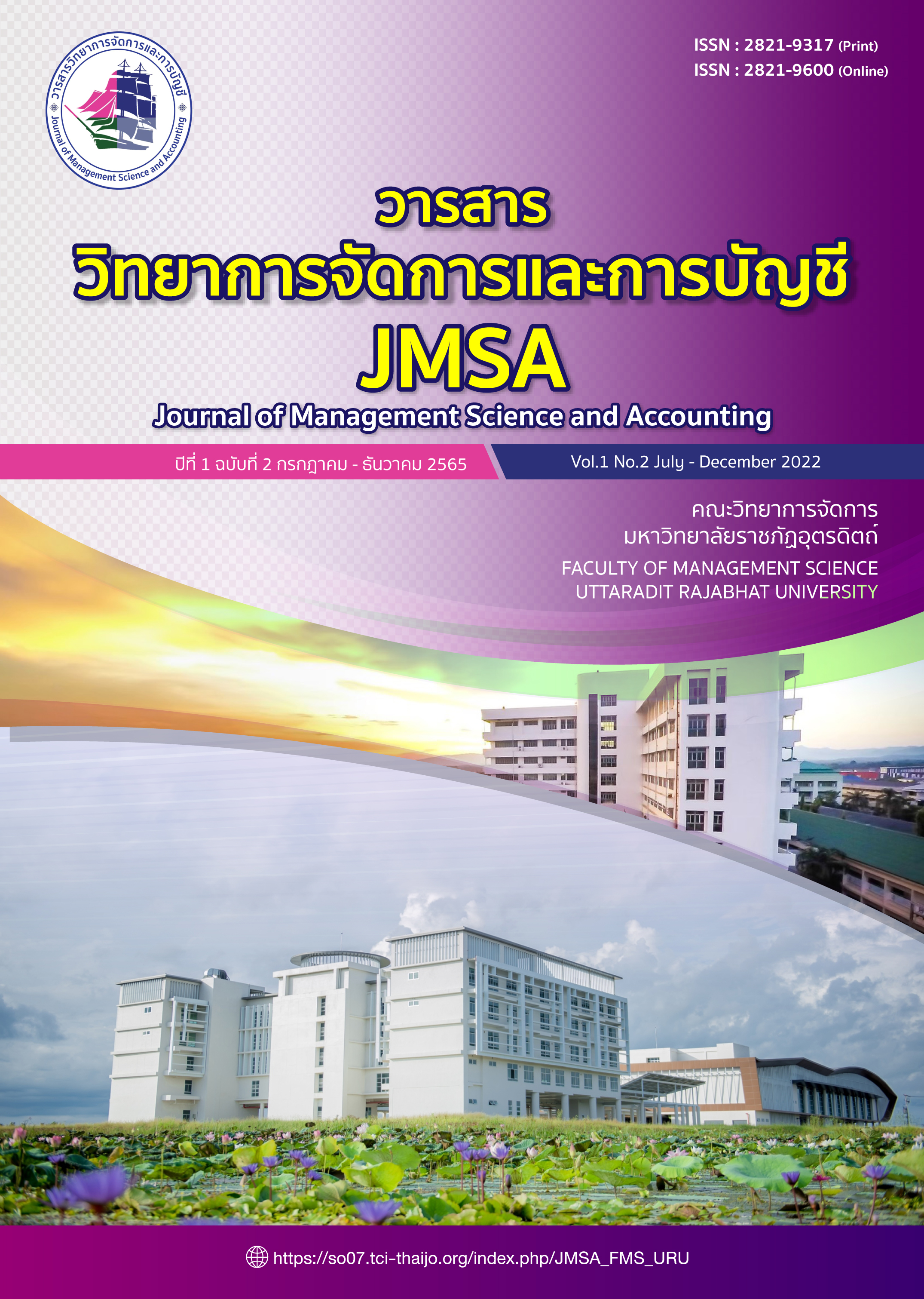คุณลักษณะการเป็นผู้ประกอบการของนักศึกษาสาขาวิชาการจัดการ คณะวิทยาการจัดการ มหาวิทยาลัยราชภัฏพิบูลสงคราม
Main Article Content
บทคัดย่อ
การวิจัยนี้มีวัตถุประสงค์ คือ 1) เพื่อศึกษาคุณลักษณะการเป็นผู้ประกอบการของนักศึกษาสาขาวิชาการจัดการ คณะวิทยาการจัดการ มหาวิทยาลัยราชภัฏพิบูลสงคราม 2) เพื่อศึกษาเปรียบเทียบคุณลักษณะการเป็นผู้ประกอบการของนักศึกษาสาขาวิชาการจัดการ คณะวิทยาการจัดการ มหาวิทยาลัยราชภัฏพิบูลสงคราม ซึ่งงานวิจัยนี้ใช้กลุ่มตัวอย่าง คือ นักศึกษาสาขาวิชาการจัดการ คณะวิทยาการจัดการ มหาวิทยาลัยราชภัฏพิบูลสงคราม จำนวนทั้งสิ้น 264 คน โดยทำการสุ่มแบบสะดวก เครื่องมือที่ใช้ในการวิจัยเป็นแบบสอบถาม ซึ่งจัดส่งในช่องทางออนไลน์ สถิติที่ใช้ในการวิเคราะห์ข้อมูล ได้แก่ ค่าร้อยละ ค่าเฉลี่ย ค่าส่วนเบี่ยงเบนมาตรฐาน และการเปรียบเทียบความแตกต่างของประชากรด้วยสถิติ t-test และ ANOVA
ผลการศึกษา พบว่า 1) นักศึกษาสาขาวิชาการจัดการมีคุณลักษณะการเป็นผู้ประกอบการอยู่ในระดับมาก 2) เพศ และชั้นปีของนักศึกษาสาขาวิชาการจัดการที่แตกต่างกันส่งผลให้คุณลักษณะการเป็นผู้ประกอบการแตกต่างกัน ผลการศึกษาสามารถนำไปใช้ในการปรับแผนการเรียนการสอน ในหลักสูตรบริหารธุรกิจที่มุ่งเน้นการสร้างผู้ประกอบการธุรกิจออกสู่ตลาดแรงงาน
Article Details

อนุญาตภายใต้เงื่อนไข Creative Commons Attribution-NonCommercial-NoDerivatives 4.0 International License.
บทความที่ได้รับการตีพิมพ์ในวารสารวิทยาการจัดการและการบัญชี มหาวิทยาลัยราชภัฏอุตรดิตถ์ เป็นลิขสิทธิ์ของมหาวิทยาลัยราชภัฎอุตรดิตถ์
บทความที่ลงตีพิมพ์ใน วารสารวิทยาการจัดการและการบัญชี มหาวิทยาลัยราชภัฎอุตรดิตถ์ ถือว่าเป็นความเห็นส่วนตัวของผู้เขียน คณะบรรณาธิการไม่จำเป็นต้องเห็นด้วย ผู้เขียนต้องรับผิดชอบต่อบทความของตนเอง
ผู้เขียนที่ตีพิมพ์ ยอมรับเงื่อนไขต่อไปนี้:
- ผู้เขียนรักษาลิขสิทธิ์และให้สิทธิ์วารสารในการตีพิมพ์ครั้งแรกพร้อมกับผลงานที่ได้รับใบอนุญาตพร้อมกันภายใต้ Attribution-NonCommercial-NoDerivatives 4.0 International (CC BY-NC-ND 4.0) ที่อนุญาตให้ผู้อื่นแบ่งปันผลงานโดยรับทราบถึงผลงานของผู้เขียนและ การตีพิมพ์ครั้งแรกในวารสารนี้
- ผู้เขียนสามารถทำข้อตกลงเพิ่มเติมตามสัญญาแยกต่างหากสำหรับการเผยแพร่ผลงานฉบับตีพิมพ์ของวารสารแบบไม่ผูกขาด (เช่น โพสต์ลงในพื้นที่เก็บข้อมูลของสถาบันหรือตีพิมพ์ในหนังสือ) โดยรับทราบการตีพิมพ์ครั้งแรก ในวารสารนี้
- ผู้เขียนได้รับอนุญาตและสนับสนุนให้โพสต์ผลงานของตนทางออนไลน์ (เช่น ในคลังข้อมูลของสถาบันหรือบนเว็บไซต์) ก่อนและระหว่างขั้นตอนการส่งผลงาน เนื่องจากอาจนำไปสู่การแลกเปลี่ยนที่มีประสิทธิผล ตลอดจนการอ้างอิงงานที่ตีพิมพ์เร็วขึ้นและมากขึ้น
เอกสารอ้างอิง
กระทรวงการอุดมศึกษา วิทยาศาสตร์ วิจัยและนวัตกรรม. (2565). History. https://www.mhesi.go.th/index.php/aboutus/history.html
ชัชวาลย์ เรืองประพันธ์. (2539). สถิติพื้นฐาน. โรงพิมพ์คลังนานาวิทยา.
ณัฐวุฒิ วิเศษ. (2552). คุณลักษณะและความตั้งใจที่จะเป็นผู้ประกอบการของนักศึกษาสาขาการเป็นผู้ประกอบการในกรุงเทพมหานคร. วิทยาลัยราชพฤกษ์.
มหาวิทยาลัยราชภัฏพิบูลสงคราม. (2565). ข่าวประกาศ. https://www.psru.ac.th/psru-group2/
Aaker, D.A., Kumar, V., & Day, G.S. (2001). Marketing Research (7th ed.). Wiley.
Awang, A., Amran, S., Nor, M. N. M., Ibrahim, I. I., and Razali, M. F. M. (2016). Individual Entrepreneurial Orientation Impact on Entrepreneurial Intention: Intervening effect of PBC and subjective norm. Journal of Entrepreneurship, Business and Economics. 4, 94–129.
Covin, J. G. and D. P. Slevin (1989). Strategic Management of Small Firms in Hostile and Benign Environments. Strategic Management Journal, 10(1), 75-87.
Greyman, V., Force, C.M. & Davis, L.M. (2015). Women in Business: Influences on the Undergraduate Major Choices. Administrative Issues Journal, 5(2), 51-63.
Haider, S. H., Asad, M., & Fatima, M. (2017). Entrepreneurial Orientation and Business Performance of Manufacturing Sector Small and Medium Scale Enterprises of Punjab Pakistan. European Business & Management, 3(2), 21–28.
Hall, R.E. & S.E. Woodward. (2010). The Burden of Non-Diversifiable Risk on Entrepreneurship. American Economic Review, 100(3), 1163-1194.
Hytti, U., Stenholm, P., Heinonen, J., & Seikkula-Leino, J. (2010). Perceived Learning Outcomes in Entrepreneurship Education: The Impact of Student Motivation and Team Behavior. Education+Training, 52(8/9), 587-606.
Louw, L., Du Plessis, A.P., Bosch, J.K. & Venter, D.J.L. (1997). Empirical Perspectives on the Entrepreneurial Traits of Undergraduate Students at the University of Port Elizabeth: An Exploratory Study. Management Dynamics, 6(4), 73-90.
Melati, I. S., Arief, S., & Baswara, S. Y. (2018). Does Financial Background Affect Entrepreneur Students’ Creativity: An Investigation of How Rich and Poor Students Start their Businesses. Journal of Entrepreneurship Education, 21(1), 1–11.
Miller, D. (1983). The Correlates of Entrepreneurship in Three Types of Firms. Management Science, 29(7), 770-791.
Nunnally, J.C. (1978). Psychometric Theory. McGraw-Hill Book.
Nunnally, J.C., & Bernstein, I.H. (1994). Psychometric theory (3rd ed.). McGraw-Hill.
Parker, S. K., Bindl, U. K., & Strauss, K. (2010). Making Things Happen: A Model of Proactive Motivation. Journal of Management, 36(4), 827-856.
Rahman, A., Civelek, M. & Kozubikova, L. (2016). Proactiveness, Competitive Aggressiveness and Autonomy: A Comparative Study from the Czech Republic. Journal of Economics and Economic Policy, 11(3), 631-650.
Rovinelli, R. J., & Hambleton, R. K. (1976). On the Use of Content Specialists in the Assessment of Criterion-referenced Test Item Validity. Annual Meeting of the American Educational Research Association, 1-37.
Sexton, D. L. & Bowman, N. (1985). The Entrepreneur: A Capable Executive and More. Journal of Business Venturing, 1(3), 129-140.
So, I. G., Ridwan, A., Simamora, B. H., and Aryanto, R. (2017). Confirming Entrepreneurial Orientation Dimensions and Linking It with Entrepreneurial Intention among Business Students in Indonesia. International Journal of Economics and Management Sciences. 11, 277–299.
Yamane, T. (1973). Statistic: An Introductory Analysis (3rd ed). Harper and Row.
Yang, J. H. (2020). A Study of Entrepreneurship Education on Entrepreneurial Orientation of Korean and Chinese University Students: Focused on Entrepreneurial Self-Efficacy as Mediator. Asia-Pacific Journal of Business Venturing and Entrepreneurship, 15(3), 233-242.
Zhai, Y.M., Sum, W.Q., Tsai, S.B., Wang, Z., Zhao, Y. & Chen Q. (2018). An Empirical Study on Entrepreneurial Orientation, Absorptive Capacity, and SMEs’ Innovation Performance: A Sustainable Perspective. Sustainability, 10(314), 1-14.


